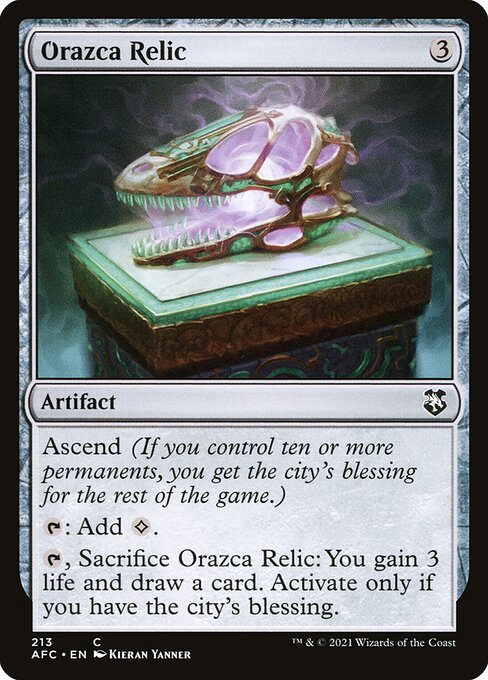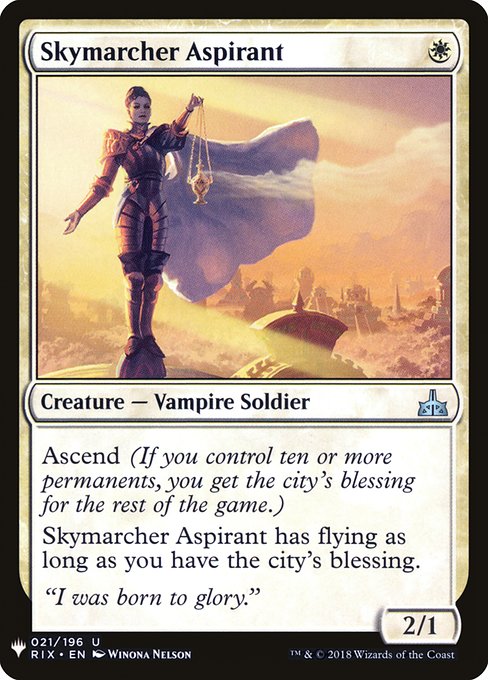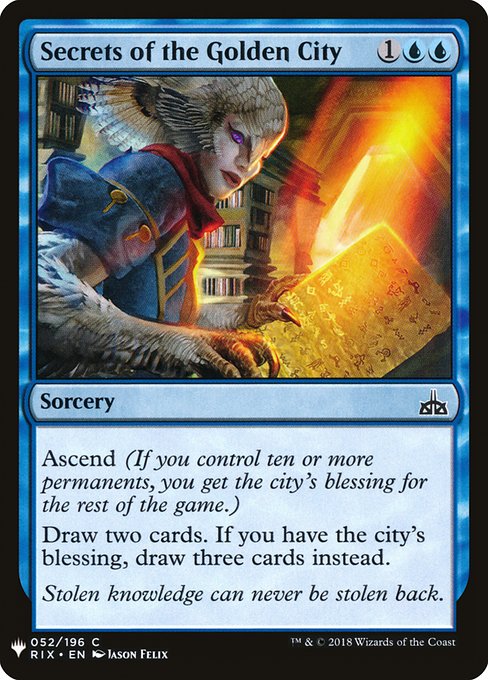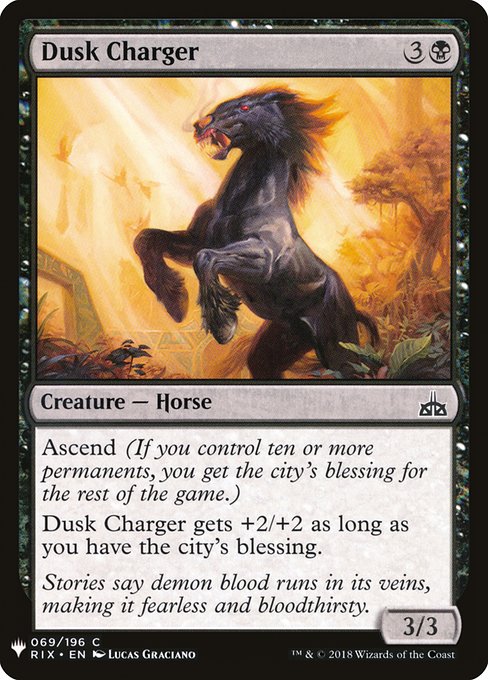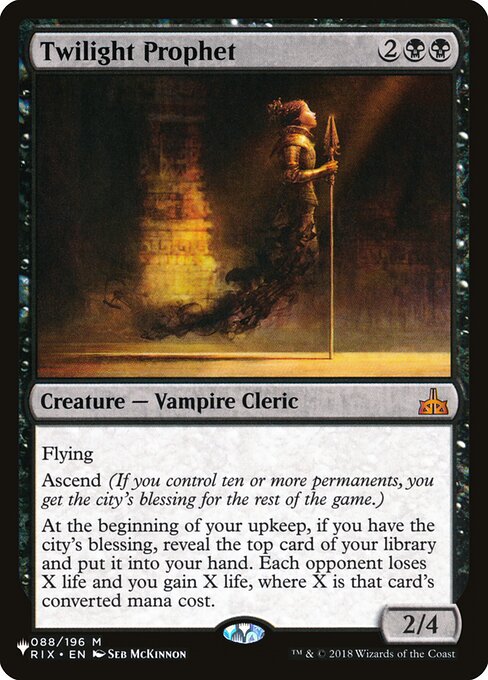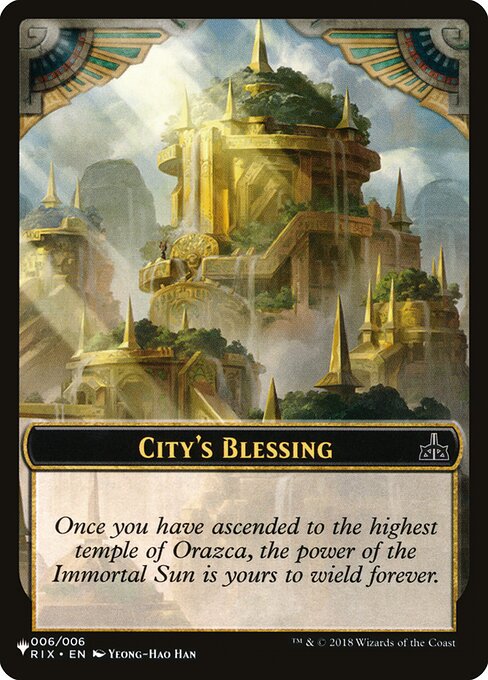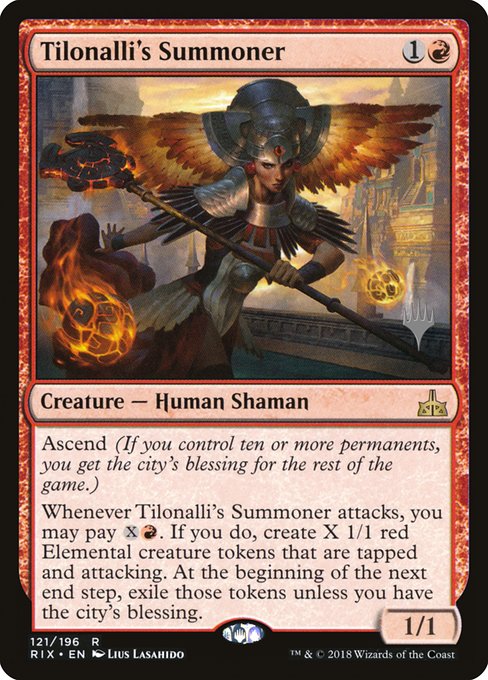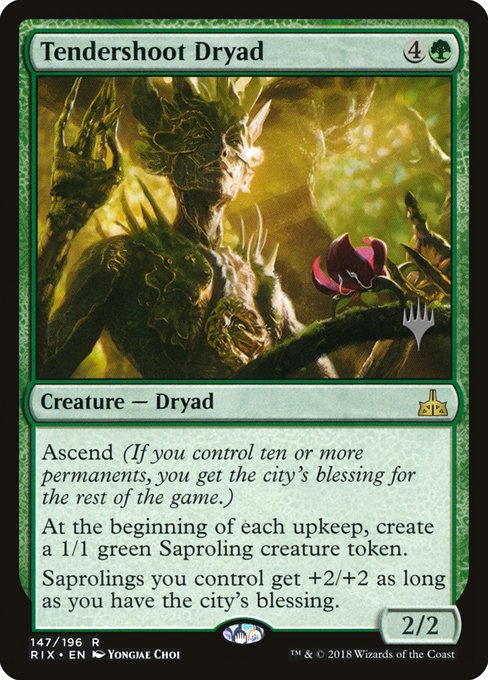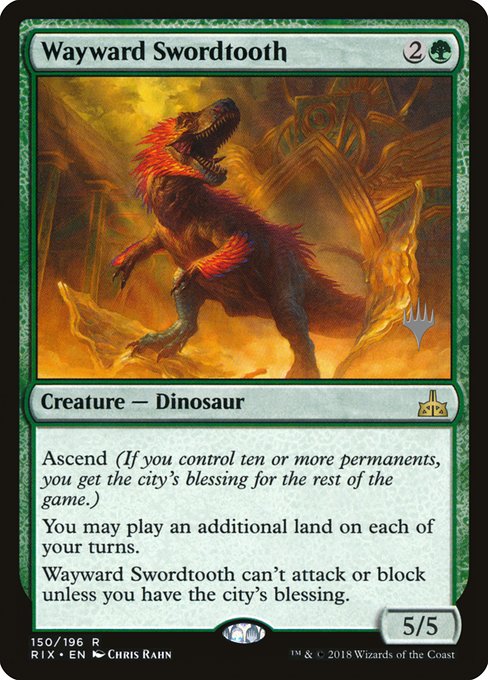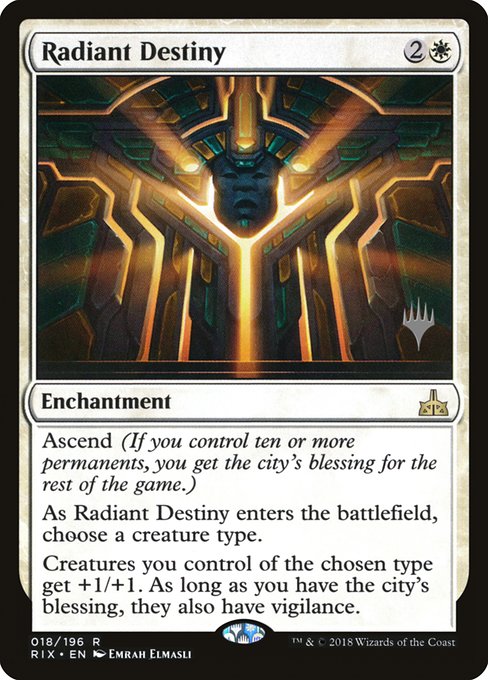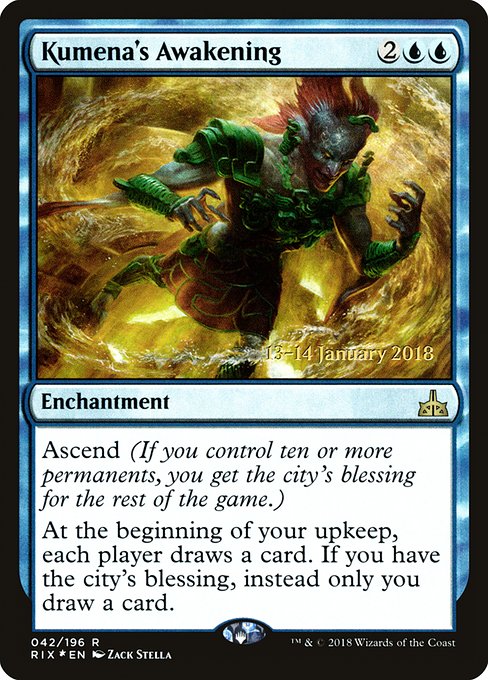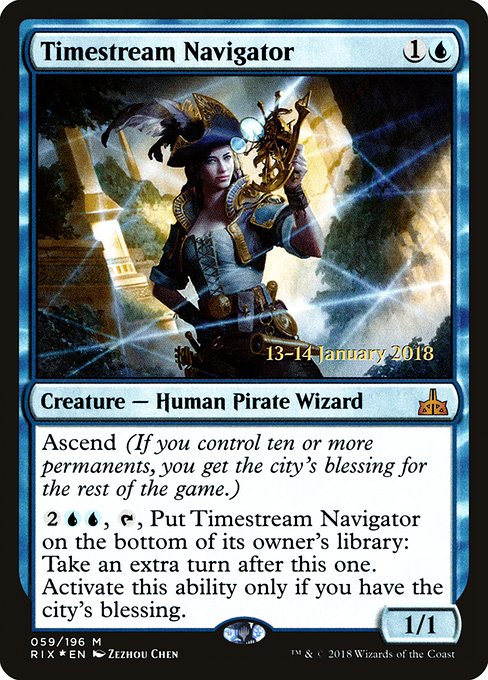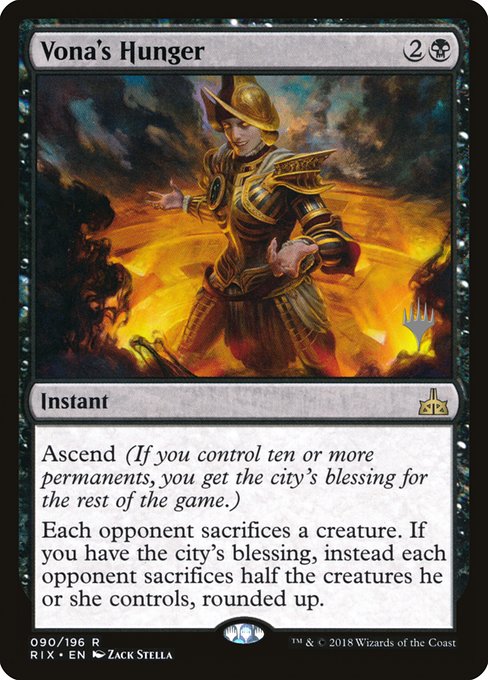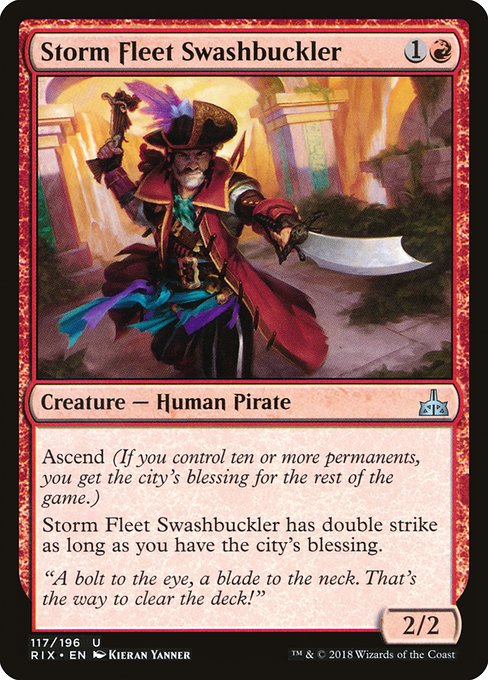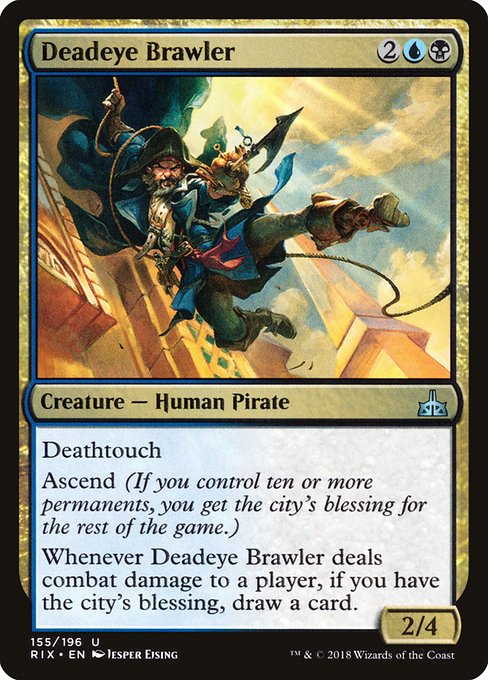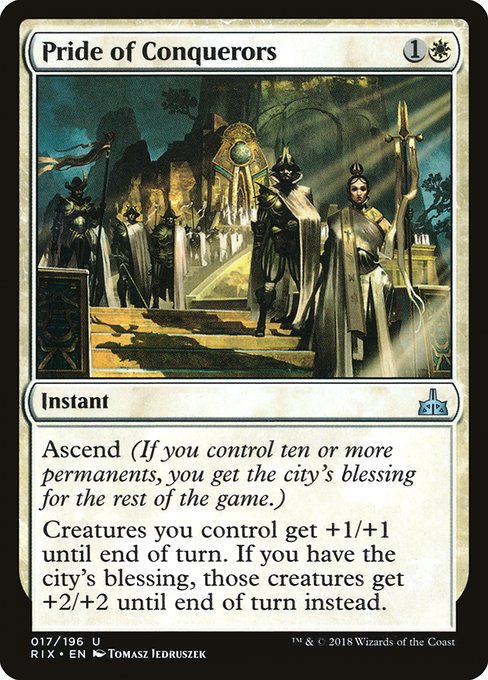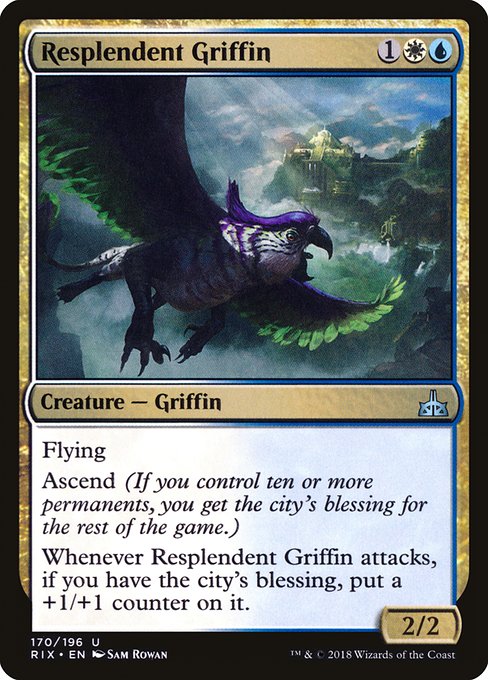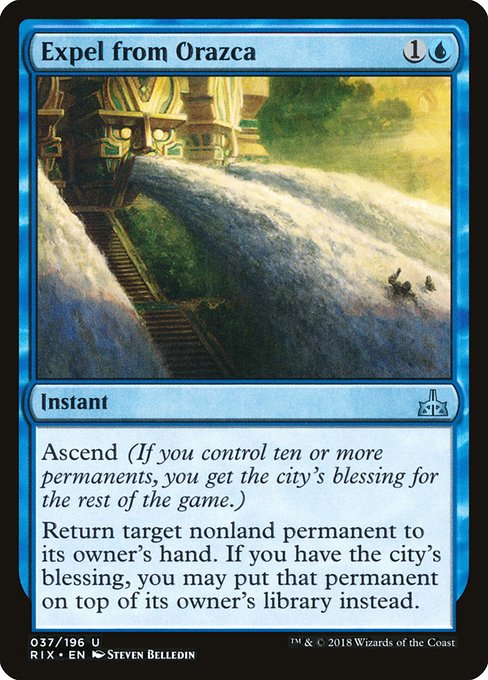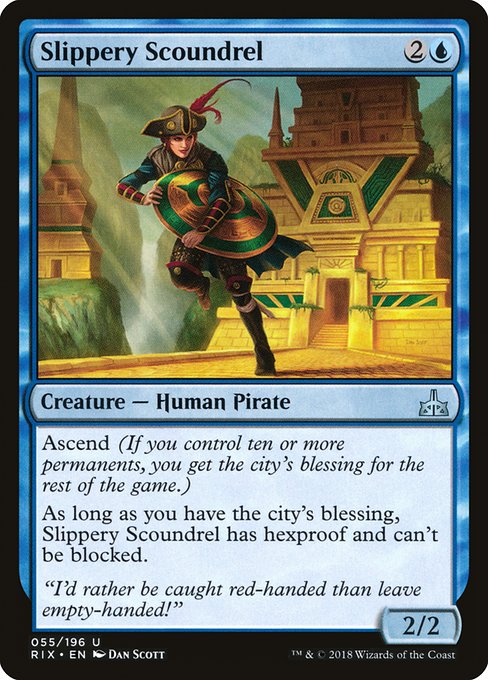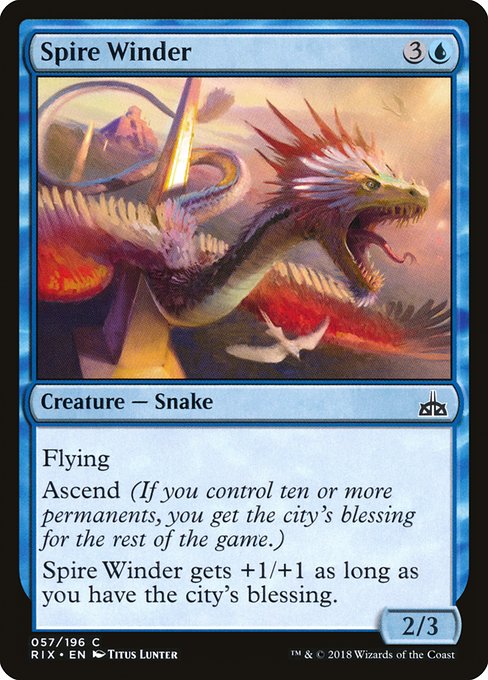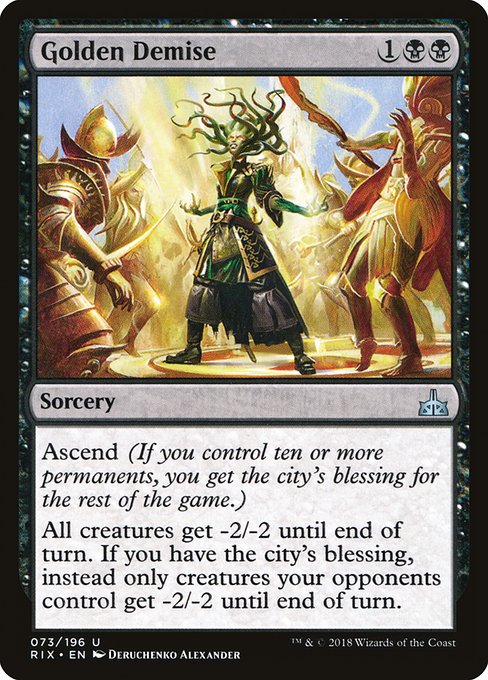standard
future
historic
gladiator
pioneer
explorer
modern
legacy
pauper
vintage
penny
commander
brawl
alchemy
paupercommander
duel
oldschool
premodern
Rulings
Once you have the city’s blessing, you have it for the rest of the game, even if you lose control of some or all of your permanents. The city’s blessing isn’t a permanent itself and can’t be removed by any effect.
A permanent is any object on the battlefield, including tokens and lands. Spells and emblems aren’t permanents.
If you cast a spell with ascend, you don’t get the city’s blessing until it resolves. Players may respond to that spell by trying to change whether you get the city’s blessing.
Some cards have triggered abilities with an intervening “if” clause that checks whether you have the city’s blessing. These are worded “[Trigger condition], if you have the city’s blessing, [effect].” You must already have the city’s blessing in order for these abilities to trigger; otherwise they do nothing. In other words, there’s no way to have the ability trigger if you don’t have the city’s blessing, even if you intend to get it in response to the triggered ability.
If you control ten permanents but don’t control a permanent or resolving spell with ascend, you don’t get the city’s blessing. For example, if you control ten permanents, lose control of one, then cast Golden Demise, you won’t have the city’s blessing and the spell will affect creatures you control.
Ascend on a permanent isn’t a triggered ability and doesn’t use the stack. Players can respond to a spell that will give you your tenth permanent, but they can’t respond to getting the city’s blessing once you control that tenth permanent. This means that if your tenth permanent is a land you play, players can’t respond before you get the city’s blessing.
If another creature you control is dealt lethal damage at the same time that Mausoleum Harpy is dealt lethal damage, Mausoleum Harpy won’t be saved by the +1/+1 counter that would have been put on it.
If your tenth permanent enters the battlefield and then a permanent leaves the battlefield immediately afterwards (most likely due to the “Legend Rule” or due to being a creature with 0 toughness), you get the city’s blessing before it leaves the battlefield.
A permanent is any object on the battlefield, including tokens and lands. Spells and emblems aren’t permanents.
If you cast a spell with ascend, you don’t get the city’s blessing until it resolves. Players may respond to that spell by trying to change whether you get the city’s blessing.
Some cards have triggered abilities with an intervening “if” clause that checks whether you have the city’s blessing. These are worded “[Trigger condition], if you have the city’s blessing, [effect].” You must already have the city’s blessing in order for these abilities to trigger; otherwise they do nothing. In other words, there’s no way to have the ability trigger if you don’t have the city’s blessing, even if you intend to get it in response to the triggered ability.
If you control ten permanents but don’t control a permanent or resolving spell with ascend, you don’t get the city’s blessing. For example, if you control ten permanents, lose control of one, then cast Golden Demise, you won’t have the city’s blessing and the spell will affect creatures you control.
Ascend on a permanent isn’t a triggered ability and doesn’t use the stack. Players can respond to a spell that will give you your tenth permanent, but they can’t respond to getting the city’s blessing once you control that tenth permanent. This means that if your tenth permanent is a land you play, players can’t respond before you get the city’s blessing.
If another creature you control is dealt lethal damage at the same time that Mausoleum Harpy is dealt lethal damage, Mausoleum Harpy won’t be saved by the +1/+1 counter that would have been put on it.
If your tenth permanent enters the battlefield and then a permanent leaves the battlefield immediately afterwards (most likely due to the “Legend Rule” or due to being a creature with 0 toughness), you get the city’s blessing before it leaves the battlefield.
Rulings
Once you have the city’s blessing, you have it for the rest of the game, even if you lose control of some or all of your permanents. The city’s blessing isn’t a permanent itself and can’t be removed by any effect.
A permanent is any object on the battlefield, including tokens and lands. Spells and emblems aren’t permanents.
If you cast a spell with ascend, you don’t get the city’s blessing until it resolves. Players may respond to that spell by trying to change whether you get the city’s blessing.
Some cards have triggered abilities with an intervening “if” clause that checks whether you have the city’s blessing. These are worded “[Trigger condition], if you have the city’s blessing, [effect].” You must already have the city’s blessing in order for these abilities to trigger; otherwise they do nothing. In other words, there’s no way to have the ability trigger if you don’t have the city’s blessing, even if you intend to get it in response to the triggered ability.
If you control ten permanents but don’t control a permanent or resolving spell with ascend, you don’t get the city’s blessing. For example, if you control ten permanents, lose control of one, then cast Golden Demise, you won’t have the city’s blessing and the spell will affect creatures you control.
Ascend on a permanent isn’t a triggered ability and doesn’t use the stack. Players can respond to a spell that will give you your tenth permanent, but they can’t respond to getting the city’s blessing once you control that tenth permanent. This means that if your tenth permanent is a land you play, players can’t respond before you get the city’s blessing.
If another creature you control is dealt lethal damage at the same time that Mausoleum Harpy is dealt lethal damage, Mausoleum Harpy won’t be saved by the +1/+1 counter that would have been put on it.
If your tenth permanent enters the battlefield and then a permanent leaves the battlefield immediately afterwards (most likely due to the “Legend Rule” or due to being a creature with 0 toughness), you get the city’s blessing before it leaves the battlefield.
A permanent is any object on the battlefield, including tokens and lands. Spells and emblems aren’t permanents.
If you cast a spell with ascend, you don’t get the city’s blessing until it resolves. Players may respond to that spell by trying to change whether you get the city’s blessing.
Some cards have triggered abilities with an intervening “if” clause that checks whether you have the city’s blessing. These are worded “[Trigger condition], if you have the city’s blessing, [effect].” You must already have the city’s blessing in order for these abilities to trigger; otherwise they do nothing. In other words, there’s no way to have the ability trigger if you don’t have the city’s blessing, even if you intend to get it in response to the triggered ability.
If you control ten permanents but don’t control a permanent or resolving spell with ascend, you don’t get the city’s blessing. For example, if you control ten permanents, lose control of one, then cast Golden Demise, you won’t have the city’s blessing and the spell will affect creatures you control.
Ascend on a permanent isn’t a triggered ability and doesn’t use the stack. Players can respond to a spell that will give you your tenth permanent, but they can’t respond to getting the city’s blessing once you control that tenth permanent. This means that if your tenth permanent is a land you play, players can’t respond before you get the city’s blessing.
If another creature you control is dealt lethal damage at the same time that Mausoleum Harpy is dealt lethal damage, Mausoleum Harpy won’t be saved by the +1/+1 counter that would have been put on it.
If your tenth permanent enters the battlefield and then a permanent leaves the battlefield immediately afterwards (most likely due to the “Legend Rule” or due to being a creature with 0 toughness), you get the city’s blessing before it leaves the battlefield.
Votre collection ? vos decks ?
Envie de gérer votre collection et/ou créer des decks ?
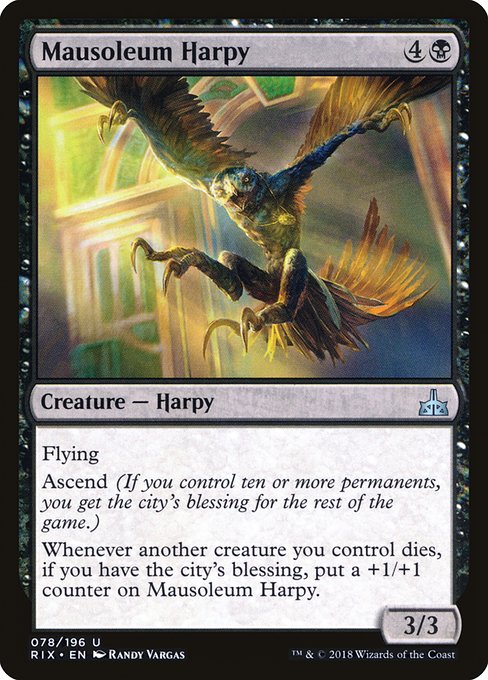

 0
0
 0.05€
0.05€
